|
|
|
Sort Order |
|
|
|
Items / Page
|
|
|
|
|
|
|
| Srl | Item |
| 1 |
ID:
123628
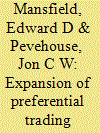

|
|
|
|
|
| Publication |
2013.
|
| Summary/Abstract |
The growing number of preferential trading arrangements (PTAs) since World War II has generated substantial interest in their economic and political effects. It has also prompted interest in the factors that give rise to PTAs, but very little research has been conducted on the growth of extant PTAs. To address this shortcoming, we analyze why some arrangements expand, whereas others do not. We find strong evidence that expansion is most likely when the existing members of a PTA display a high degree of trade openness and when the size distribution of these members is fairly uniform. We also find that PTAs that add new members are likely to do so again in the near future and that, throughout the global system, PTAs tend to expand in clusters. Equally, there is some indication that the market size of a PTA affects its odds of expansion. Finally, we investigate which states join enlarging PTAs. We find that PTAs expand by taking on new members that are economically and politically similar to existing members.
|
|
|
|
|
|
|
|
|
|
|
|
|
|
|
|
| 2 |
ID:
123530
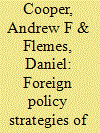

|
|
|
|
|
| Publication |
2013.
|
| Summary/Abstract |
This Introductory Review examines the major debates concerning the rise of emerging powers in the global system. It points to the fundamental difference between the contours of ascendancy in the first quarter of the twenty-first century from previous historical eras with reference to the number of countries placed in this category, the privileging of economic dimensions of power, and the much more elaborate and open levels with regard to institutionalization. Ample attention is paid to the BRICS, but consistent with the image of multipolarity, it also gives some emphasis to the question of whether the changing global system provides enhanced space for middle powers. After highlighting these highly relevant contextual considerations, the core of the Review moves to an analysis centred on more specific puzzles about the foreign policy strategies of emerging powers. One major puzzle is whether the preference of rising states is to work through established institutions or to utilize parallel and/or competitive mechanisms. Another concerns the balance between material interests, status-enhancement, and identity issues as motivators for policy preferences. Still another focuses on the degree to which China should be differentiated from the other BRICS, or indeed whether the BRICS share values such as a common politics of resentment or want to differentiate themselves on a normative-oriented basis in alterative groupings such as IBSA. A more sophisticated awareness of the limitations as well as of the capacities of the BRICS - with an appreciation of the intricate mix of concerns about solidarity and sovereignty, as well as conceptual tensions between realism and complex interdependence - is not only important for assessing the future trajectory of the BRICS role in the world, but in locating space for categories of countries such as middle powers. The major puzzle for middle powers is whether or not they will be able to mobilize attributes, notably the leveraging of 'network power', that provide them with comparative advantage. Although in overall terms the global system has not progressed towards multipolarity in a linear fashion underwritten by alternative actors, it is precisely due to this imprecision - and level of academic and operational contestation - that the articles assembled in this Special Issue have such salience.
|
|
|
|
|
|
|
|
|
|
|
|
|
|
|
|
| 3 |
ID:
127011
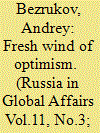

|
|
|
|
|
| Publication |
2013.
|
| Summary/Abstract |
The international system is currently in the midst of a profound crisis. Each cycle of "creative destruction" of the old world order changes "the rules of the game." The new international system will be shaped by new factors of success and new behaviors of its actors. The faster a country adapts to the new rules, the more successful it will be in the coming 10 to 20 years. The speed of the adaptation to the new global environment will greatly depend on the capacity of governments to understand where the world is going and to build a sound competitive strategy.
The Atlantic Council, in its recent report "Envisioning 2030: U.S. Strategy for a Post-Western Word," based on the scenarios published by the National Intelligence Council, believes that the United Stated has a second chance to win the dominant position in the world. Remarkably, Russia gets almost no mention in the report, it is virtually written off as an influential player of the future.
Does Russia have a chance in the new global system? What are its challenges? What should Russia do to succeed? We believe that the success of Russia will depend on its ability to rethink its place in the world and devise a new strategy that would differ from the one it used in era of the Euro-Atlantic great-power rivalry.
|
|
|
|
|
|
|
|
|
|
|
|
|
|
|
|
| 4 |
ID:
128216
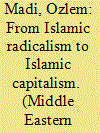

|
|
|
|
|
| Publication |
2014.
|
| Summary/Abstract |
The rise of Turkish Islamic capitalism, and with it an Islamic bourgeoisie and the accompanying lifestyle has profound implications for the Muslim world, since the Turkish Muslims have been backed by a relatively successful democratic and liberal system that has allowed them to integrate more easily into the global system. Focusing mainly on the members of the Islamic-oriented Association of Economic Entrepreneurship and Business Ethics (?G?AD), the aim of this article is to demonstrate the inherent (in)compatibility and contradictions between Islam and capitalism in contemporary Turkey, and by extension in the Muslim world. From the start, for the Turkish Muslim bourgeoisie, the burning questions were 'how to earn' and, more importantly, 'how to consume' within a capitalist system while still not transgressing Islamic boundaries. In order to overcome these challenges, the article argues that, rather than creating an 'alternative Islamic economic system', Islamic actors have reduced - in some cases, even eliminated - this discursive and ideological tension between Islam and capitalism by (a) trying to introduce Islamic morality into capitalism and (b) redefining both Islam and capitalism. Through these mechanisms they have also broadened and deepened Turkish modernity.
|
|
|
|
|
|
|
|
|
|
|
|
|
|
|
|
| 5 |
ID:
104454


|
|
|
| 6 |
ID:
099764


|
|
|
|
|
| Summary/Abstract |
This essay argues that the Japanese cinema of the studio era, roughly from 1930 to 1960, should be considered as a "classical cinema" that occurred in parallel fashion to classical Hollywood cinema, which flourished during the same period. It is important to shift the discussion from the terms of an art cinema to those of a popular industrial cinema to fully understand the potential influence of Japanese cinema in Asia and globally as a body of Films recycled on broadcast TV and DVD Formats
|
|
|
|
|
|
|
|
|
|
|
|
|
|
|
|
| 7 |
ID:
129189
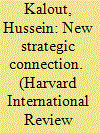

|
|
|
|
|
| Publication |
2014.
|
| Summary/Abstract |
Keen to establish itself as an actor with greater importance in global geopolitics, today's Brazil seeks a foreign policy in accordance with its present stature and aspirations. The country has emerged from the periphery of the international order to become a global player with an enhanced voice on the international stage, eager to ascend to the epicenter of the most powerful nations, and with some degree of influence upon the global system.
|
|
|
|
|
|
|
|
|
|
|
|
|
|
|
|
| 8 |
ID:
137729
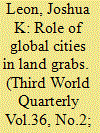

|
|
|
|
|
| Summary/Abstract |
Key trends link a globally connected urban archipelago and its hinterlands, warranting new studies of power in its most contemporary forms. This article locates land power and where that power is exercised – looking at the burgeoning global land rush from the perspective of cities. Urbanisation continues to drive vast political transitions, uprooting longstanding agrarian modes of living while creating myriad inequalities within cities. Are the world’s most powerful agglomerations active agents in this transformation? Answering affirmatively, the article reframes urbanisation as a vast, global geopolitical transfer of power from rural to urban. Leading global cities like New York, London, Hong Kong, Chicago and Singapore are not merely impressive collections of factor endowments. They are also sites of concentrated power with coercive influences beyond municipal boundaries. The article asks how cities project power in the contemporary global system. Juxtaposing data on global connectivity with the location strategies of private firms, we learn that the world’s most successful global cities are also sources of exploitative accumulations of land.
|
|
|
|
|
|
|
|
|
|
|
|
|
|
|
|
|
|
|
|
|